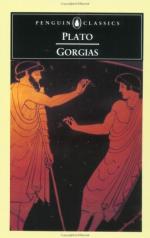
|
| Name: _________________________ | Period: ___________________ |
This test consists of 5 multiple choice questions, 5 short answer questions, and 10 short essay questions.
Multiple Choice Questions
1. Socrates classifies "flattery" as something that does not engage what?
(a) God.
(b) The body or soul.
(c) Intelligence.
(d) The public.
2. What does Socrates believe that wanting and desiring involve feeling?
(a) Pleasure.
(b) Pain.
(c) Hope.
(d) Selfish.
3. Why does Socrates ask to be corrected in his arguments?
(a) Because he thinks he is incorrect.
(b) Because he wants the others to exercise their minds.
(c) Because he thinks the conversation has lulled.
(d) Because he wants to get to the truth.
4. According to Callicles, what do people who are happiest without?
(a) Money and material.
(b) Inhibition.
(c) Want and desire.
(d) Obstruction of laws.
5. What does Socrates say people who are victims of injustice need to acquire?
(a) Strength.
(b) Ego.
(c) Protection.
(d) Money.
Short Answer Questions
1. Socrates believes that men of substance do not engage in things that are not what?
2. In Callciles' opinion, why is philosophy destructive?
3. Socrates believes bad people feel what?
4. In Socrates' opinion, what is an evil way to deal with injustice?
5. Socrates explains that good is not necessarily what?
Short Essay Questions
1. According to Socrates, how can one attain harmony and why is it important?
2. What effect does Socrates believe order and self-control have on happiness?
3. According to Socrates, if one desires nothing, are they happy? Why or why not?
4. Is "justice" one sided? Can there be multiple types of justice? Why or why not?
5. According to Callicles, where is philosophy useful and how can it be detrimental?
6. Why does Socrates dislike things like cookery?
7. According to Socrates, what is the result of a young person being raised under an unjust government?
8. Callicles argues that one should not neglect the natural order. What does the natural order offer that convention cannot?
9. What is Socrates' theory about the dangers of mass-influence and how it relates to useful and useless action?
10. According to Callicles, where should one's rights originate from?
|
This section contains 759 words (approx. 3 pages at 300 words per page) |

|




